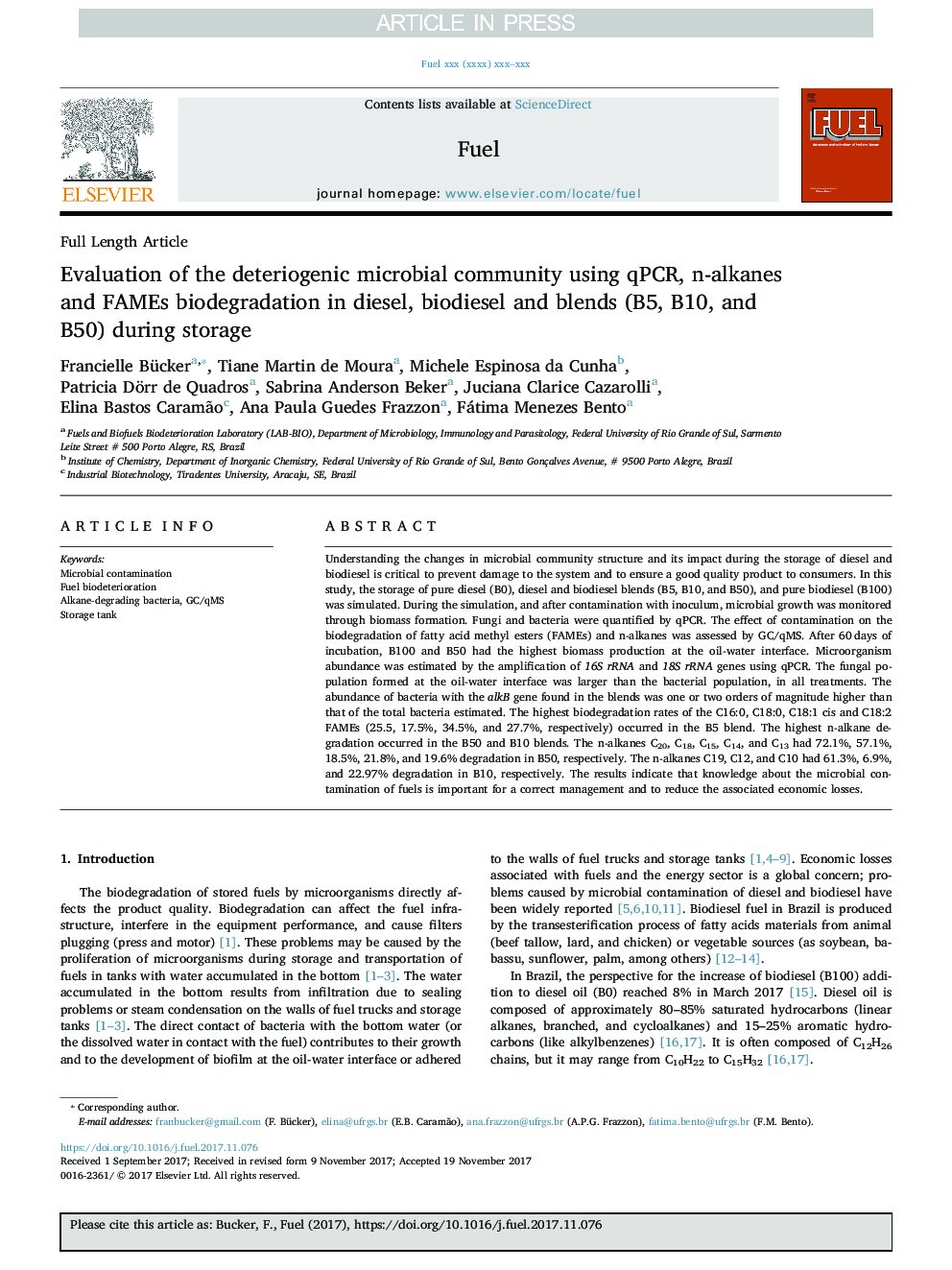| کد مقاله | کد نشریه | سال انتشار | مقاله انگلیسی | نسخه تمام متن |
|---|---|---|---|---|
| 11000576 | 1424931 | 2018 | 7 صفحه PDF | دانلود رایگان |
عنوان انگلیسی مقاله ISI
Evaluation of the deteriogenic microbial community using qPCR, n-alkanes and FAMEs biodegradation in diesel, biodiesel and blends (B5, B10, and B50) during storage
دانلود مقاله + سفارش ترجمه
دانلود مقاله ISI انگلیسی
رایگان برای ایرانیان
موضوعات مرتبط
مهندسی و علوم پایه
مهندسی شیمی
مهندسی شیمی (عمومی)
پیش نمایش صفحه اول مقاله

چکیده انگلیسی
Understanding the changes in microbial community structure and its impact during the storage of diesel and biodiesel is critical to prevent damage to the system and to ensure a good quality product to consumers. In this study, the storage of pure diesel (B0), diesel and biodiesel blends (B5, B10, and B50), and pure biodiesel (B100) was simulated. During the simulation, and after contamination with inoculum, microbial growth was monitored through biomass formation. Fungi and bacteria were quantified by qPCR. The effect of contamination on the biodegradation of fatty acid methyl esters (FAMEs) and n-alkanes was assessed by GC/qMS. After 60â¯days of incubation, B100 and B50 had the highest biomass production at the oil-water interface. Microorganism abundance was estimated by the amplification of 16S rRNA and 18S rRNA genes using qPCR. The fungal population formed at the oil-water interface was larger than the bacterial population, in all treatments. The abundance of bacteria with the alkB gene found in the blends was one or two orders of magnitude higher than that of the total bacteria estimated. The highest biodegradation rates of the C16:0, C18:0, C18:1 cis and C18:2 FAMEs (25.5, 17.5%, 34.5%, and 27.7%, respectively) occurred in the B5 blend. The highest n-alkane degradation occurred in the B50 and B10 blends. The n-alkanes C20, C18, C15, C14, and C13 had 72.1%, 57.1%, 18.5%, 21.8%, and 19.6% degradation in B50, respectively. The n-alkanes C19, C12, and C10 had 61.3%, 6.9%, and 22.97% degradation in B10, respectively. The results indicate that knowledge about the microbial contamination of fuels is important for a correct management and to reduce the associated economic losses.
ناشر
Database: Elsevier - ScienceDirect (ساینس دایرکت)
Journal: Fuel - Volume 233, 1 December 2018, Pages 911-917
Journal: Fuel - Volume 233, 1 December 2018, Pages 911-917
نویسندگان
Francielle Bücker, Tiane Martin de Moura, Michele Espinosa da Cunha, Patricia Dörr de Quadros, Sabrina Anderson Beker, Juciana Clarice Cazarolli, Elina Bastos Caramão, Ana Paula Guedes Frazzon, Fátima Menezes Bento,